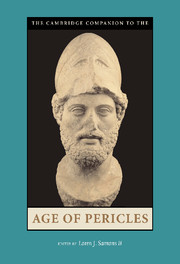Book contents
- Frontmatter
- Introduction: Athenian History and Society in the Age of Pericles
- 1 Democracy and Empire
- 2 Athenian Religion in the Age of Pericles
- 3 The Athenian Economy
- 4 Warfare in Athenian Society
- 5 Art and Architecture
- 6 Other Sorts: Slaves, Foreigners, and Women in Periclean Athens
- 7 Drama and Democracy
- 8 The Bureaucracy of Democracy and Empire
- 9 Plato’s Sophists, Intellectual History after 450, and Sokrates
- 10 Democratic Theory and Practice
- 11 Athens and Sparta and the Coming of the Peloponnesian War
- Conclusion: Pericles and Athens
- Bibliography
- Index
1 - Democracy and Empire
Published online by Cambridge University Press: 28 March 2009
- Frontmatter
- Introduction: Athenian History and Society in the Age of Pericles
- 1 Democracy and Empire
- 2 Athenian Religion in the Age of Pericles
- 3 The Athenian Economy
- 4 Warfare in Athenian Society
- 5 Art and Architecture
- 6 Other Sorts: Slaves, Foreigners, and Women in Periclean Athens
- 7 Drama and Democracy
- 8 The Bureaucracy of Democracy and Empire
- 9 Plato’s Sophists, Intellectual History after 450, and Sokrates
- 10 Democratic Theory and Practice
- 11 Athens and Sparta and the Coming of the Peloponnesian War
- Conclusion: Pericles and Athens
- Bibliography
- Index
Summary
In the past half-century it has often seemed paradoxical, and to the politically correct embarrassing, that Athens in the second half of the fifth century was democratic, and indeed a champion of democracy in the Greek world, and therefore admirable, but was also the head of the greatest empire in which Greeks controlled other Greeks, and therefore deplorable. One advantage available to those who challenged the orthodox dating criteria for fifth-century Athenian inscriptions, and moved to the 420s texts which orthodoxy placed ca. 450, was that the more extreme manifestations of imperialism could be associated not with Pericles, of whom (following Thucydides) we ought to approve, but with Cleon, of whom (again following Thucydides) it was respectable to disapprove: “None of the inscriptional evidence for fully organized Athenian imperialism can be dated before 431 B.C. Even the very language of imperialism does not seem to have been current until the last years of Perikles' ascendancy.” G. E. M. de Ste. Croix, in an avowedly if idiosyncratically Marxist interpretation of ancient history, developed the idea first expressed by G. Grote (who in the nineteenth century did more than anybody else to make Athenian democracy an object of praise) that, despite the judgment of Thucydides that the Athenians exercised their power as far as they could, as was natural, and their subjects hated it, as also was natural, in fact the Athenian empire was unpopular only with upper-class oligarchs in the member cities and was popular with lower-class democrats: “It is unique among past empires known to us in that the ruling city relied very much on the support of the lower classes in the subject states.”
- Type
- Chapter
- Information
- The Cambridge Companion to the Age of Pericles , pp. 24 - 45Publisher: Cambridge University PressPrint publication year: 2007
- 4
- Cited by

